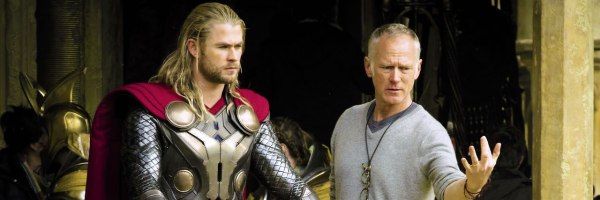While many of you might not know Alan Taylor's name, you've definitely seen his work. He's directed great episodes of Game of Thrones, Boardwalk Empire, Bored to Death, Mad Men, The Sopranos, Rome, Sex and the City, Deadwood, Lost, The West Wing, Homicide: Life on the Street, and many more. So when I first heard Taylor would be directing his first feature, Marvel's Thor: The Dark World, my initial thought was "about time."
During a break in filming last year on the London set, I got to participate in a group interview with Taylor. He talked about making the film his own, what it's been like directing his first feature after working so long in the world of TV, how much of the story had changed during production, whether Joss Whedon was involved with the script, the villains and their motives, and more. Hit the jump to either read or listen to what he had to say.
If you'd like to listen to the audio from this interview click here. Otherwise the full transcript is below. Thor: The Dark World opens November 8th.
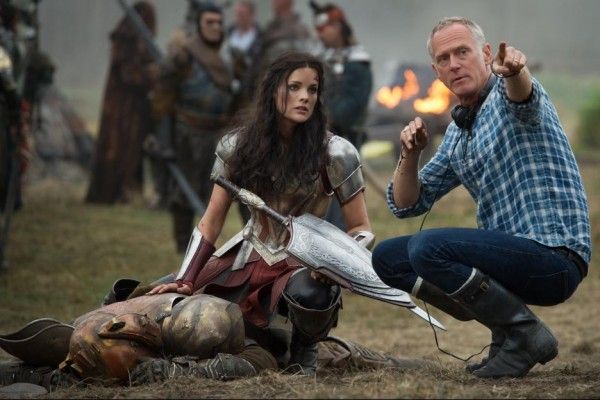 Question: When they did the movie with Kenneth [Branagh], it was almost kind of like a pilot for a Thor series—it had that specific look. And this movie’s obviously changed that look. I was curious about going into that knowing you’re going to be changing the look and it was the second movie.
Question: When they did the movie with Kenneth [Branagh], it was almost kind of like a pilot for a Thor series—it had that specific look. And this movie’s obviously changed that look. I was curious about going into that knowing you’re going to be changing the look and it was the second movie.
 Question: When they did the movie with Kenneth [Branagh], it was almost kind of like a pilot for a Thor series—it had that specific look. And this movie’s obviously changed that look. I was curious about going into that knowing you’re going to be changing the look and it was the second movie.
Question: When they did the movie with Kenneth [Branagh], it was almost kind of like a pilot for a Thor series—it had that specific look. And this movie’s obviously changed that look. I was curious about going into that knowing you’re going to be changing the look and it was the second movie.
ALAN TAYLOR: It’s funny you use the word “pilot.” I’ve spent a lot of time in television and I’m a recovering TV director or whatever, but a lot of the television experiences apply well here because there is an episodic quality to it. It is Vol. 2 of something that’s already been established. But like in television I try and put my stamp on what’s already been established and see what I can do to give it my sensibility a little bit. Ken’s movie was very successful, it brought together an amazing cast, I think focused what could be a huge rambling mythology on very intimate family relations—brother vs. brother and father and son—and that was all brilliant. The only problem I had with his movie was, the look of it to me, felt too shiny and sort of brand new. I understand the choices, it was basically because the Asgardians and that take were very much a futuristic alien race that we mistook for gods. When I came in I was in love with the Norse mythology, I was in love with sort of grounding it more in a kind of Viking, Medieval look. There’s a history and weight and stuff like that and Marvel seemed to have an interest in that as well.
So, coming off of Game of Thrones, where we sort of enjoy combining fantasy with some sense of three-dimensionality and real life—that’s what I try to bring in here. It’s a funny balancing act because you have to be funny in the way that Marvel’s funny and you have to be true to some pretty absurd things—like, you guys saw elves in spaceships earlier. But then try to make that relatable and real, and textured and rich. In Asgard, for example, we’re seeing the backstreets of Asgard rather than the shiny, golden palace and we go into some shiny palace rooms but we try to blow them up this time. And on Earth, it’s London and trying to capture a contemporary London so that ideally you can have the pleasures of something that feels real but also all the joys that comes along with a Marvel movie. We’ll see whether we’re pulling off this combination or not.
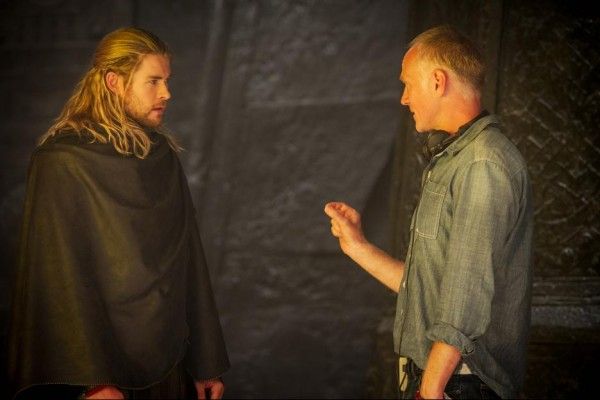 You mentioned you’re a recovering TV director. How different is a director of films as opposed to television?
You mentioned you’re a recovering TV director. How different is a director of films as opposed to television?
TAYLOR: I can go on and on because it’s partly directing television vs. film but it’s also, in my experience, HBO vs. Marvel. I’ve been sort of spoiled on the TV end because HBO feels like a small institution making independent movies. There’s respect for the director’s contribution in a way that mainstream television doesn’t really reflect, I don’t think. And in Marvel, I came in expecting the worst. I had a friend who had done a big studio movie that was also a sequel and he emailed me at one point and said, “You have no idea. Nobody here gives a flying fuck what I think about anything.” I came in braced for that but it’s been very, very different. Marvel in its weird way, also is a small group, smaller station so it’s like you’re making an impact movie that just happens to cost multi-millions of dollars. It’s a handful of people in a room making the decisions, so that creative process is not that different. You’re dealing intimately with the people that you’re making the movie with. I haven’t quite adjusted with the fact that they respect the director more in movies. I’m still used to deferring to somebody. It’s been liberating and fun to have more input that I’m used to but at the same time this is a huge ocean liner and I’m learning when you can and can’t turn the ocean liner.
Is that scary?
TAYLOR: Scary is a good word for it. Stressful. I’ve discovered new layers of stress I never knew existed. At the same time, the cast is wonderful, the crew is wonderful. I cannot complain about how I’ve been handled by Marvel but yeah, stress, absolutely. There is a Marvel process where the script is sort of the last thing you get. I come from a writer-driven medium where the script is the first thing you get and then you get to do all your directing after that. And this one, they seem pretty comfortable with the script being the last thing to fall into place. So, that’s been a source of stress.
This movie is being released in 3D, correct?
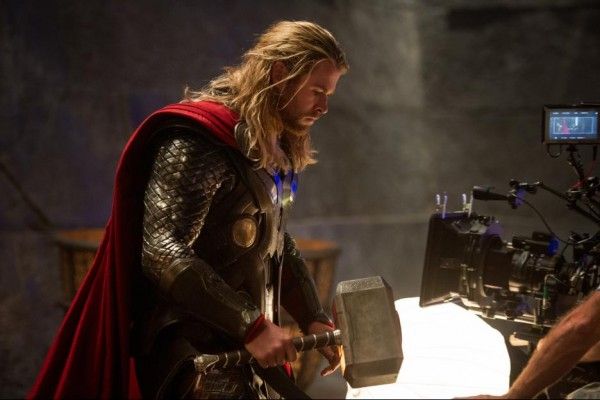 TAYLOR: Yeah, so we hear. I was walking to set and the PA was reading something on their iPad and, “Oh! Look, Disney says...”
TAYLOR: Yeah, so we hear. I was walking to set and the PA was reading something on their iPad and, “Oh! Look, Disney says...”
I’m curious about the decision not to film in 3D.
TAYLOR: When I was getting involved, I did not want to get into 3D. I’ve seen some 3D things that made me unhappy. On the one side it was the negatives about not being happy with what I’d seen, the positives were that I had gone through a brief course with Sony and got really excited about the language that 3D can speak and realized that I would have to learn a lot to speak that language. When I came into this movie, it was very much a 2D movie. I was kind of relieved that I wasn’t going to have to speak a different language I hadn’t learned yet. Part way through the process, like it’s common, it was decided mostly for financial reasons—I think, you know markets are constantly being read to see where the payoff is—so, I think the decision was made that it was a good idea to do 3D. So, we’ve heard that partway through, we are aware of it now, I’m not radically changing the way I’m shooting it, we’ll see. I think we have wonderful imagery, I think that’s the one great thing about the Marvel universe is it gives you a chance to play with big, wonderful imagery, which hopefully will be a pleasure in 3D. But we aren’t throwing spears at the camera any more than we were before. We’ll see what happens.
From when you got involved with the project to where you are right now, how much has the project shifted along the way, in terms of the story you’re telling, characters being involved?
TAYLOR: The story has shifted a lot. That’s part of the roller coaster of having a script that was very much in flux. When I came, they had a first draft by an author, we merely brought in a new writer and took it in a very different direction. I won’t go into details about what we thought of that draft but it’s been wild and wooly path. Some things were agreed upon very early on—who are villains were going to be, what the arc of Jane’s relationship were going to be. Things like that were pretty much understood from the beginning but there are characters in it now that weren’t in it. I was pushing to bring some people back that weren’t originally coming back and I still consider the script a work-in-progress.
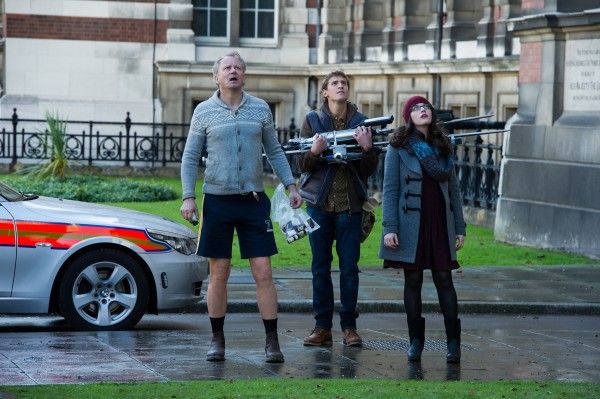 With Joss Whedon being involved in the Marvel universe, singing this big deal, did he look at it and give a pass at the script?
With Joss Whedon being involved in the Marvel universe, singing this big deal, did he look at it and give a pass at the script?
TAYLOR: No. He read a draft and there is still some hope that he would come in and do some stuff on it for us—under the table kind of, now that he is the table. So, we’re all hoping for that but nothing yet. He gave his seal of approval to some things but we haven’t gotten a draft as such from him.
Everyone associates your name with what you did on Game of Thrones and think it’s a perfect fit for Thor. But what was your interest in the character, beyond the fact that you worked in a similar medium before? What drew you into wanting to get into this Marvel comic world?
TAYLOR: It was partly exactly the things that I found myself enjoying in Game of Thrones. Game of Thrones was the first fantasy thing I’ve done and like a lot of people who enjoy the show watching it, I didn’t expect to respond to that world but when I started doing it, I really started to love it, started to realize that some of the things I’m naturally drawn to. Like, that kind of an epic scale of imagery that’s also grounded in intimate relationships. This is what you can find in Thor as well. There’s this funny thing, I finally realized that I’ve been drawn again and again—when I did Deadwood, when I did Rome. I love things that have one foot in history—I was going to be a history professor before I sold out and went into TV. So, things that speak and evoke that is really exciting to me, and Thor, even though he’s a Marvel character, is also deeply rooted in Norse mythology. And you can go see the look of our sets and it’s deeply embedded or drawn from Norse sources and Celtic sources. I just love drawing on past human cultures, that’s a thrill for me. I saw Avengers—a rough cut— around the time I was getting involved and loved the balance of tones that Marvel does. They can make you really care and then they can make you laugh with just happened and just when you think this is ridiculous, they let you know it’s ridiculous and that’s a wonderful dance that they do. I saw some of their films recently only had one of those tones and once you get used to the Marvel thing, you sort of miss the other tones, it’s funny. I remember seeing Avengers with my very young kids and the first laugh that came along, it was like they were liberated, “Oh we’re allowed to laugh. That’s funny!”
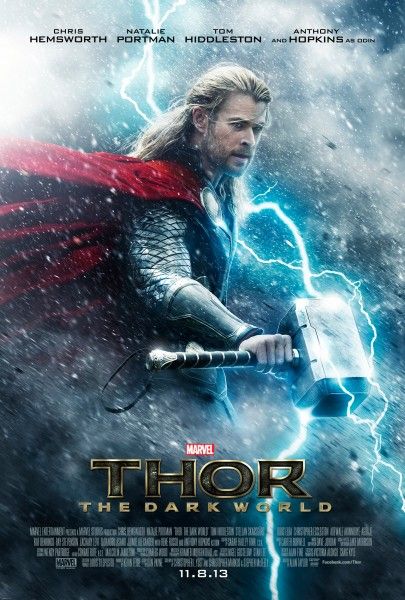 There are so many locations and sets and vehicles, how do you decide on what you’re getting done and what has to get done?
There are so many locations and sets and vehicles, how do you decide on what you’re getting done and what has to get done?
TAYLOR: I think stress was mostly in prep because then you’re worrying about every possible thing but when you start shooting you don’t have much choice but to focus on tomorrow morning, so that’s mostly what you focus on. Game of Thrones, again, we were shooting in Croatia and Belfast and Iceland, more or less simultaneously and I got used to sort of having attention spread around but also we have a fantastic designer and I have a fantastic DP, and a lot of that stuff you just kind of start to trust at a certain point.
You talked about the villains being one of the things you kind of agreed on right from the get-go. Can you tell us about introducing a new villain like Malekith and tells us a bit about what his goals are in this film?
TAYLOR: It was clear early on that we were going to be dealing with the dark elves and that Malekith was going to be our guy. He’s very much on a mission of vengeance and on reclaiming what is rightfully his, that’s not an unfamiliar device. Early on I started thinking that he has something in common with Roy Batty, who had a righteous mission that you sort of sympathize with and a kind of humanity, even though he was an evil bastard. And his name is escaping me but the bad guy in the J.J. Abrams’ wonderful Star Trek, very similar thing, coming back to avenge something. So that sort of came along with him, he started getting more personal, I started being American and found myself sort of bringing some Osama Bin Laden in. We always knew he was on a task of—I think two things happened, his mission became grander and grander and we sort of invented a time scale for where he’s been and what his backstory is that we got big enough for Thor. I think other superheroes can fight bad guys in Gotham City or can fight bad guys in Metropolis or whatever but Thor is part of this epic thing he’s also got going on that. Our villains have been around for five-thousand years, they’ve been pissed off since the Big Bang so there’s a kind of scale. You know, Odin’s father had to fight them. I liked again that sense of history, that sense of scale to what the mission is but also on the other end, trying to make it intimate. It’s important to me that you saw him with Adewale who’s playing Algrim, who later becomes Kurse, important to me that they have an intimate relationship so you felt the kind of brotherly—you know, you got Thor and Loki, and you got Algrim and Malekith, have some chance for an intimate connection. So, it’s not just, “Must have bad guys blowing things up.”
For more Thor: The Dark World set visit coverage:
- 50 Things to Know About THOR: THE DARK WORLD Plus Spoiler Free Video Blog Recap
- Tom Hiddleston Talks THE AVENGERS Aftermath, the Darker Tone, His Ownership of the Character, and More on the Set of THOR: THE DARK WORLD
- Chris Hemsworth Talks Expanding Beyond Asgard, Building to THE AVENGERS 2, and More on the Set of THOR: THE DARK WORLD
- Producer Craig Kyle Talks the Involvement of S.H.I.E.L.D., the Film's Design and Locations, and More on the Set of THOR: THE DARK WORLD
- Adewale Akinnuoye-Agbaje Talks Playing Two Characters, Algrim's Relationship with Malekith, and More on the Set of THOR: THE DARK WORLD
- 10 New High-Resolution Images from THOR: THE DARK WORLD

